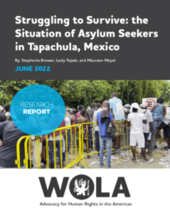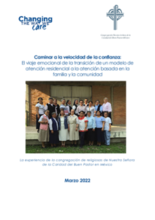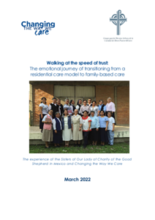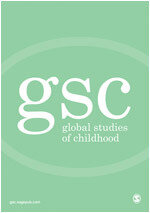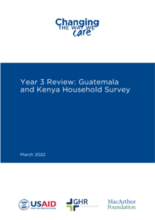Displaying 61 - 70 of 379
This report follows the route of asylum seekers arriving in Tapachula. It draws on a March 2022 visit during which the researchers conducted field documentation and interviews with asylum seekers, government officials, UN agencies, and civil society organizations providing services to migrants. The report highlights abuses, arbitrary treatment, and steep obstacles faced by asylum seekers at each step of their process.
Just over the zigzag pathway of the Tijuana border crossing, a mile or so from the taco and churros stands that feed locals and tourists alike, past the indigenous women sitting on the sun-scorched sidewalk and begging for change with infants at their breasts, rests a pop-up encampment for Ukrainian and Russian refugees fleeing an invasion they could neither endure nor support.
More than 2,000 have reached the U.S. border with Mexico, where an expected spike in migration from other countries will raise tough questions: Who gets priority?
These two case studies focus on kinship care: one describes kinship care in the Kenya context and the other describes family-based alternative care in Guatemala, including kinship care. They are meant to help practitioners better understand the practical implications of kinship and other forms of family-based alternative care and inform similar work in other contexts. These case studies have been produced by Changing the Way We CareSM, a global initiative implemented by Catholic Relief Services and Maestral International, and other global, national and local partners working together to change the way we care for children around the world.
This webinar was hosted by the Transitioning Residential Care Working Group of the Transforming Children’s Care Global Collaborative Platform and showcased learning around the transition of residential care services.
Este informe documenta las primeras etapas de un proceso de aprendizaje entre Cambiando la forma en que Cuidamos y la Congregación de las Hermanas de Nuestra Señora de la Caridad del Buen Pastor en México a medida que ellas avanzan en su proceso de transición. Este documento está dirigido a los profesionales, las organizaciones y los actores católicos interesados en apoyar o participar en un proceso de transición con las organizaciones católicas y también proporciona información útil para aquellos que participan en la transición con actores no religiosos. Esto incluye un importante aprendizaje relacionado con la forma de acompañar a las religiosas en el proceso de transición, comprendiendo los matices relacionados con el tiempo, el contenido y el enfoque. Y lo más importante es que explora el componente emocional que conlleva el hecho de que las religiosas, adapten el enfoque de su carisma a medida que se transforman, pasando de proporcionar atención residencial a una atención basada en la familia y la comunidad.
This brief documents the first stages of a learning process between Changing the Way We CareSM and the Mexican Province of the Congregation of the Sisters of Our Lady of Charity of the Good Shepherd as the Sisters moved forward in their transition process. It is written for practitioners and organizations, including Catholic actors interested in supporting or engaging in a transition process with women religious and also provides useful information for those engaging in transition with non-faith actors.
Informed by a case review of 36 Guatemalan children supported to reintegrate into families, and interviews with social workers and psychologists engaged in the process, this article explores the role of the “community connectedness” wellbeing domain. The authors explore how community connectedness or lack thereof, can contribute to child and parent/caregiver wellbeing and successful reintegration—the different types of community connectedness and who/what was involved in establishing and fostering these connections.
In 2021 Changing the Way We Care (CTWWC) completed a household survey of children and caregivers, in demonstration countries Kenya and Guatemala, to understand their experience of CTWWC services, the protective factors in their families, and the status of child well-being. Part of CTWWC’s year-three evaluation, these resulting four reports are meant to help CTWWC partners, and other care reform actors within Guatemala and Kenya, better understand CTWWC’s impact through the end of the initiative’s third year.
This report contains the complete Kenya and Guatemala Household Survey results.

